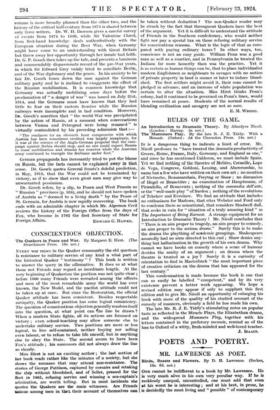CONSCIENTIOUS OBJECTION. •
The Quakers in Peace and War. By Margaret E. Hirst. (The Swarthmore Press. 16s. net.) EVERY war raises in the Quaker community the old question Is resistance to military service of any kind a vital part of the historical Quaker " testimony " ? This book is written to answer the query in the affirmative. It does so at what those not Friends may regard as inordinate length. At the very beginning of Quakerism the position was not quite clear ; before 1660 many Friends were recruited among the officers and men of the most remarkable army the world has ever known, the New Model, and the pacifist attitude could not be taken up at once. But since the Restoration, the official Quaker attitude has been consistent. Besides respectable antiquity, the Quaker position has some logical consistency. The question of conscientious objection generally resolves itself into the question, at what point can 'the line be drawn ? When a modern State fights, all its actions are focussed on victory ; even school-teaching may allow someone else to undertake military service. Two positions are more or less logical, to live self-contained, neither buying nor selling even labour, or to refuse to take life oneself, but in anything else to obey the State. The second seems to have been Fox's attitude ; his successors did not always draw the line so clearly.
Miss Hirst is not an exciting author ; the last section of her book reads rather like the minutes of a society, but she shows the romance that may attend ,non-resistance. The stories of George Pattison, captured by corsairs and retaking the ship without bloodshed, and of Seller, pressed for the Beet in 1665, refusing service and winning a sea-captain's admiration, are worth telling. But in most incidents she quotes the Quakers are the main witnesses. Are Friends laniaue among men in thaS, their account of themselves can
be taken without deduction ? The non-Quaker reader may be struck by the fact that throughout Quakers have the best of the argument. Yet it is difficult to understand the attitude of Friends in the Southern confederacy, who would neither fight nor pay a special tax on those refusing military service for conscientious reasons. What is the logic of that as com- pared with paying ordinary taxes ? In other ways, too, conscience is not an easy guide. William Penn was a good man as well as a courtier, and in Pennsylvania he treated the Indians far more honestly than was the practice. Yet it is as certain as human things can be, that to place individualist modern Englishmen as neighbours to savages with no notion of private property in land is sooner or later to induce blood- shed. The first settlers might avoid it, their sons cannot be pledged in advance, and an increase of white population was certain to alter the situation. Miss Hirst thinks Penn's colony, had it continued to be governed on. Penn's lines, would have remained at peace. Students of the normal results of blending civilization and savagery are not so sure.
E. M. WRONG.










































 Previous page
Previous page